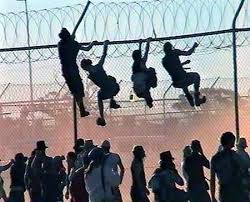Crossing the border.
If you want to come to an Anarchist Action Network action from abroad, you are very welcome! But here is some information you might find useful.
If you are an EU citizen:
Britain is not in the Schengen zone, so you will get stopped and asked to show your passport or ID at the border. The police have the power to search you and ask questions. However, according to experienced legal activists, it is very unlikely that you will be refused entry to the UK (unless you are very high profile). If they think that you are coming for a big action, it is quite possible that you will be searched and asked questions, but then let through the border.
In theory, the police do have the power to refuse entry to EU citizens in extreme cases, on ‘public policy’ grounds. They can do this if you pose ‘a sufficiently serious threat to fundamental interests in society’. This can be because of serious criminal convictions, but it can also include your conduct or membership of a particular ‘undesirable’ group. For example, this power has been used against high profile public figures, e.g., Dutch fascist MP Geert Wilders. But legal activists say that is unlikely to be used unless you are particularly high profile: for example, if you have a particularly serious criminal record, or if there is a specific warning about you on a European police database.
If you are not an EU citizen:
Rules for visas for non-EU citizens depend a lot on different countries: you need to check with the Home Office website to see what rules apply to your country. Be aware that it is easier, and fairly common, for the police / immigration officers to refuse entry if you are not a EU citizen. They are likely to ask you to explain why you are coming to the UK, and they may ask you to show that you have money to stay in the UK, that you have a place to stay, etc. If you need more specific information you can also contact us at anarchistactionnetwork@riseup.net.
General advice.
The strongest border controls are usually at airports. You are probably more likely to be checked and questioned at an airport than on the channel tunnel or at a ferry port. Ferry ports usually have the easiest controls, at least if you are coming on foot, on a bike, or in a normal car. If you cross by car on the ferry, it is very common for a guard to just take a quick look at your passport and wave you through without asking questions.
HOWEVER be aware that at Calais and other ferry ports vans, camper vans, minibuses, and lorries are very often checked, as the police are looking for migrants hiding in larger vehicles. They sometimes use dogs, heat and CO2 detectors and other sensing devices to check large vehicles. Also, the Eurolines coaches are very commonly stopped for immigration controls.
It is possible that before large actions there will be extra tight checks at the border. If you do not want to be searched or questioned, it is a good idea to travel as inconspicuously as possible. Try to look “normal”, and travel in a normal car rather than in a large group of activists on a coach. Again, it is unlikely that coaches will be turned away, but it is likely that you will be searched and asked questions.
Schedule 7.
The other thing you should be aware of is the so-called “Schedule 7” anti-terrorist law. This gives the police the right to stop and question anyone at the border, without giving you your normal rights under police questioning. That is, legally you DO have to answer their questions. They can hold you for up to 9 hours even without suspecting you of any offence. They can also take cameras, computers, and mobile phones and keep them for up to 7 days to collect information. If you refuse to answer questions, they can charge you with a criminal offence. Since October 2013 you are entitled to have a solicitor present during questioning.
This law is highly controversial. It is supposed to only be used to prevent terrorism, not to gather information on protests. But the police widely abuse it to try and increase their ‘intelligence’. Some activists have decided to refuse to answer questions, on the grounds that the law has not been applied properly because the questioning was not really connected to terrorism. So far the police have been reluctant to charge people who have done this, probably because they know they could be criticised in the courts for misusing these powers. But if you decide to refuse to answer questions you need to be aware that you are taking a risk.
If you have problems at the border.
If you have any questions, or if you get stopped at the border and need legal advice, you can call the Green & Black Cross legal hotline. The number is: 00 44 7946 541511
If you do get stuck at the border in France you can also contact our friends at Calais Migrant Solidarity, who can help arrange legal support in France if necessary. Their numbers are: 07 53 47 51 59 (from inside France)
or 00 33 75 34 75 159 (from outside France).

